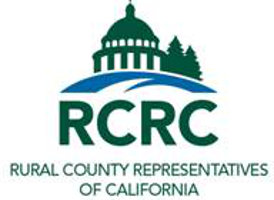Sacramento, CA…Earlier this month, I was sworn in as Chair of the Rural County Representatives of California, better known as RCRC. The core of RCRC’s mission is to improve the ability of small, rural California county governments to provide services by advocating on their behalf, and promoting a greater understanding among policy makers about the unique challenges that face California’s small population counties.


I am honored to have been selected by my fellow RCRC Board Members to lead the organization in 2017, which is shaping up to be another challenging year for California’s rural counties. As an organization we will work to identify new ways to address ongoing, unresolved issues such as State Payment in Lieu of Taxes (State PILT), Secure Rural Schools and Federal Payment in Lieu of Taxes (Federal PILT), and forestry management and wildfire funding, all of which heavily impact California’s rural counties in a multitude of ways.
In addition to identifying new avenues to advocate for ongoing issues, much of the year will be spent developing and advocating for legislative proposals on a handful of proactive opportunities, including disadvantaged communities, the Williamson Act, local marijuana taxes, multi-county assessment appeals boards, driving impaired by marijuana usage, and reclamation of metallic pit mines, to name a few.
The following is a brief synopsis of the legislative proposals and strategic efforts RCRC and its local government partners will be considering to address these issues:
Disadvantaged Communities
Legislation would change how disadvantaged communities are defined for the purposes of allocating certain funding sources, such as Cap-and-Trade auction revenues. Current definitions unfairly exclude some of the most socio-economically disadvantaged areas in the state, many of which are found in RCRC-member counties.
State Payment in Lieu of Taxes (PILT)
State PILT was established in 1949 to offset adverse impacts to county property tax revenues that result when the State acquires private property for wildlife management areas. Prior to 2015, the State had not made annual payments in more than a decade, resulting in arrearages of more than $19 million to 36 California counties. RCRC plans to sponsor legislation to change recently-amended language that now makes these payments permissive as opposed to required, and will work to recoup the arrearages through the Budget process.
Liens Against Real Property/Local Marijuana Taxes
Legislation would authorize counties to collect locally-imposed taxes on marijuana cultivation via the property tax roll. RCRC would be joining Humboldt County and the County Treasurer-Tax Collectors Association in co-sponsoring this effort.
Multi-County Assessment Appeals Boards
Legislation would authorize, at the discretion of the Boards of Supervisors, two or more counties to establish a multi-county assessment appeals board to hear property tax disputes.
Driving Impaired by Marijuana Usage
Legislation would trigger data collection by traffic enforcement authorities when a person is charged/convicted of operating a motor vehicle impaired by marijuana usage. RCRC would be joining law enforcement groups in co-sponsoring this effort.
Reclamation of Metallic Pit Mines
Legislation would specify that lead agencies would be able to approve alternative methods of reclamation where these alternatives have been considered during the project’s environmental review and found to be environmentally superior to backfilling. RCRC may join as a co-sponsor along with the mining industry.
In the year ahead we also anticipate that the Legislature will continue to consider various policy options to address the state’s housing shortage and the housing affordability gap. Recent reports have found that more than 50 percent of California households cannot afford the cost of housing. RCRC will be at the forefront of this issue, once again working with our local government partners to preserve local control while working to ensure that rural communities have the support they need to expand development of affordable housing units.
The new federal Administration is already moving toward the repeal and possible replacement of the Affordable Care Act (ACA). This wide sweeping change to healthcare coverage may take up to a decade to implement, however, California’s legislative leadership has stated they will defend the accomplishments of ACA implementation in this state. To that end, California’s rural counties will secure a place in the conversation to ensure that the defense, repeal, or replacement is not done on the backs of our rural communities.
Water will once again be a top agenda item as the Administration, State Agencies, and the Legislature move forward on multiple fronts. We expect the Brown Administration to extend considerable effort in ensuring implementation of the Sustainable Groundwater Management Act and meeting the June 30, 2017 deadline for the establishment of Groundwater Sustainability Agencies.
In addition to these outlined Legislative proposals, we will work to address the transportation funding crisis at both the state and local level. Raising transportation taxes and fees should be a last option; however, we need to also dramatically reform the way CalTrans delivers transportation projects as well as ensure that any new transportation revenues are used solely for transportation under the existing distribution formulas.
We are working to address water-related challenges in California’s rural communities. Without safe and reliable drinking and wastewater facilities, these communities struggle to compete with more populated regions in California, impacting the ability for these rural communities to retain and attract citizens, and stunting economic growth opportunities. Access to affordable and reliable high-speed broadband is also critical for small and medium sized businesses to experience success. RCRC and its partners are working to enhance the quality of life in rural communities, and improve the economic outlook for future generations.
There is a lot to be done, and the RCRC Board of Directors and I look forward to working with our partners and associated stakeholders to continue to advance the policies important to rural California.


